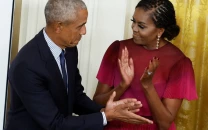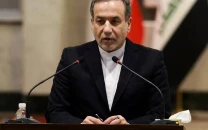Israeli election’s likely implications
Should centrist party join Netanyahu’s coalition, it may result in softening latter’s hardline position on peace...

The writer was Pakistan’s ambassador to the EU from 2002-2004 and to the US in 1999
tariq.fatemi@tribune.com.pk
Though a matter of satisfaction to the country’s right wing and its strident supporters in the US, the results convey a more nuanced picture than generally perceived. Not only has Netanyahu’s coalition been reduced from 42 to 31 seats, an even more extreme right-wing politician, Naftali Bennett, who is a strong advocate of the settlement policy on Palestinian land, failed to live up to his pre-election billings, doing worse than expected, with only 11 seats.
It is, therefore, no surprise that Netanyahu’s political opponents are celebrating his electoral losses, with the left-leaning newspaper, Haaretz, calling it a vote of no-confidence resulting from Netanyahu’s “failure in the political sphere, the foreign policy sphere and the socio-economic sphere”. It would, however, be premature to begin writing Netanyahu’s political obituary, given his intelligence and skill in building coalitions. Nevertheless, this belligerent hawk appears to have been weakened, which prompted Roger Cohen of the The New York Times to write that “(US President Barack) Obama will not be the only world leader allowing himself a quiet smile”.
Even more significant has been the impressive performance by the Yesh Atid Party, led by the television celebrity, Yair Lapid. Having won 19 seats in a parliament of 210, it could play a decisive role in the formation of a coalition government likely to emerge at the end of tortuous negotiations. Should this centrist party join Netanyahu’s coalition, it may result in some softening in the latter’s hardline position on the issue of peace talks with the Palestinians. On the other hand, if it refuses to join hands with Netanyahu, the latter would be forced to reach out to small extreme right-wing parties, whose agenda is frighteningly uncompromising.
What should then one make of the election results? For a start, the centre is not dead, as many feared. The resumption of the peace process, however, holds little interest to most Israelis, many of whom are sceptical of concessions being made by the Palestinians. Lapid, too, is doubtful of the Palestinian leadership’s willingness to negotiate but supports the two-state solution and renewal of peace talks that have remained frozen for the past four years. This is also evident from the poor showing by Tzipi Livni, the only politician to publicly call for peace dialogue with the Palestinians. The electorate’s primary focus remains on domestic issues, deeply worried as it is about unequal distribution of benefits and unsatisfactory performance of economic and social sectors. Some political observers do, however, detect a glimmer of hope in the rejection of the extreme right-wing party and the success of Yesh Atid. Netanyahu may yet, if he so desires, be able to leave a mark on his country’s history by initiating a meaningful peace process.
Much will, however, depend on the Obama Administration, as is recognised by all sides that yearn for peace in the Middle East. But after having been burnt badly on this issue in the very first months of his presidency and thereafter stymied at every step by Netanyahu, the US president may lack personal resolve and political capital essential to resurrect the peace process. In fact, President Obama hardly mentions the Palestinian issue. Moreover, having declared that his second term’s focus would be on ‘nation building’ at home, his domestic agenda is already loaded with programmes likely to arouse strong Republican opposition.
And yet, Obama knows that US interests in the Middle East demand a peaceful resolution of the Palestinian issue. And with no more elections to fight, one can only hope that he is able to summon the courage to do so and convince both Israelis and Palestinians to recognise their own strategic gains, rather than to seek tactical advantages.
Published in The Express Tribune, February 6th, 2013.



















COMMENTS
Comments are moderated and generally will be posted if they are on-topic and not abusive.
For more information, please see our Comments FAQ